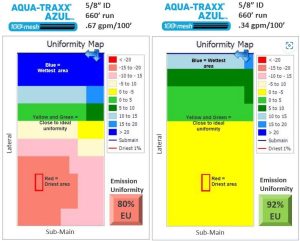
July is Smart Irrigation Month, and to help promote drip irrigation best practices in ag and farming, we put together this small list of ways you can optimize your irrigation system.
Don’t make the mistake of wasting irrigation water. Do your homework and learn about crop water requirement, the maximum precipitation rates of soils, soil water holding capacities, irrigation system application rates and irrigation system uniformities. Put it all together in an irrigation schedule that will maximize profitability and optimize resource use. And finally, don’t go it alone. Consult with a specialist to help with this sometimes complicated topic – there are many ready and willing to help, if you are only willing to ask!
The Do’s & Don’ts of Drip Irrigation
1. DON’T: Don’t apply water too fast
DO: Match the irrigation system’s application rate with the soil’s ability to accept the water. Micro-irrigation systems have low precipitation rates and are a good way to avoid runoff.
2. DON’T: Don’t apply water for too long.
DO: Match the irrigation event duration with the soil’s ability to hold the amount of water applied. Automate valve operation if labor availability or reliability is an issue.
3. DON’T: Don’t settle for poor irrigation system performance.
DO: Ensure that irrigation application uniformity is at least 85%. If a retrofit or upgrade is necessary, the investment will likely be offset by savings/increased income.
4. DON’T: Don’t schedule irrigations according to an arbitrary calendar interval.
DO: Schedule irrigations when available water has been depleted and needs to be replenished. Plant Water Requirement changes continually with the weather and stage of crop growth– irrigation schedules must be adjusted constantly.
5. DON’T: Don’t go it alone!
DO: Seek guidance from your local irrigation dealer, government agency, consultant or association. Plant/soil/water relationships are complex and deserve a specialist!




